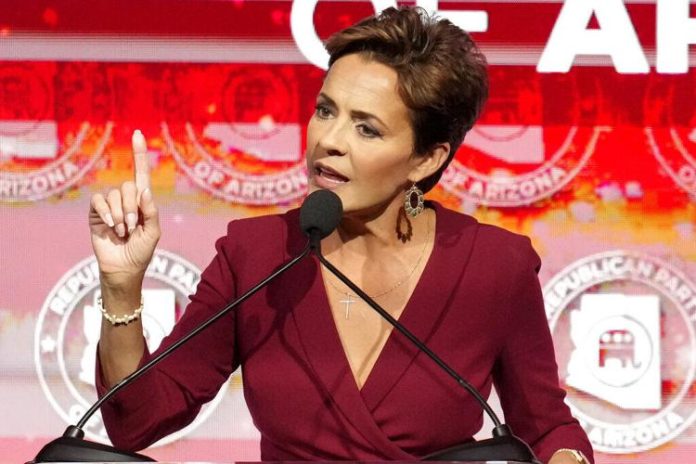
Since her loss in the Arizona governor’s race, Republican Kari Lake has claimed the election was stolen and promised bombshells showing she was the rightful winner. But on the first day of trial in her election challenge Wednesday, her lawyers alleged small-bore problems that didn’t appear to show the widespread, intentional misconduct she would need to prove.
Lawyers for the former television anchor, who lost to Democrat Katie Hobbs by more than 17,000 votes, are focusing on problems with ballot printers at some polling places in Maricopa County, home to more than 60% of voters. The defective printers produced ballots that were too light to be read by the on-site tabulators at polling places. Lines backed up in some areas amid the confusion.
County officials say everyone had a chance to vote, and all ballots were counted since ballots affected by the printers were taken to more sophisticated counters at the elections department headquarters.
Lake’s attorneys also claim the chain of custody for ballots was broken at an off-site facility, where a contractor scans mail ballots to prepare them for processing. They claim workers at the facility put their own mail ballots into the pile rather than returning them through normal channels and also that paperwork documenting the transfer of ballots was missing. The county disputes the claim.
Lake was among the most vocal 2022 Republicans promoting former President Donald Trump’s election lies, which she made the centerpiece of her campaign. While most of the other election deniers around the country conceded after losing their races in November, Lake has not. Instead, she is asking the judge to either declare her the winner or order a revote in Maricopa County.
She faces extremely long odds in her challenge, needing to prove not only that misconduct occurred but also that it was intended to deny her victory and did in fact, result in the wrong woman being declared the winner.
In court on Wednesday, Maricopa County Recorder Stephen Richer said he didn’t do anything personally to sabotage the election and wasn’t aware of anyone purposefully interfering with the printers. “Absolutely not,” Richer said when asked about it.
Scott Jarrett, one of Maricopa County’s elections directors, disputed the suggestion by one of Lake’s lawyers that the printer problems on Election Day represented a disruption in the election process.
Jarrett said voters who experienced those problems still had a chance to cast a ballot and that if lines were long at one location, voters could vote at nearby locations that weren’t as busy. “There were options for voters to participate,” Jarrett said.
A witness who examined ballots on behalf of the Lake campaign, Clay Parikh, said 14 ballots that he examined had a 19-inch image of the ballot printed on 20-inch paper, meaning the ballot wouldn’t be read by a tabulator. Parikh said someone changed those printer configurations.
“It could not be by accident,” Parikh said. “Those are configuration changes.”
Tom Liddy, an attorney representing Maricopa County, suggested the images in question may have been slightly smaller as a result of a shrink-to-fit feature being selected on a printer. If such a ballot wasn’t accepted by the tabulator, Liddy said the ballot could still be duplicated so that it could be read by the tabulator and the selections could be counted.
Heather Honey, another witness testifying on behalf of the Lake campaign on election operations, pointed to a statement filed in court by an employee of the company that scans ballots to prepare them for processing.
In the document, the employee said county election workers didn’t include a key chain of custody document when delivering ballots from drop boxes on election night and that people working for the contractor are allowed to bring in their own ballots and those of their family members and give them to the sorting department.
The contractor’s employee estimated seeing about 50 ballots being given to the sorting department by workers.
Another attorney for Maricopa County said Honey had no other evidence of votes being injected into the system, besides the statement by the employee of the contractor.
“That’s not an answerable,” Honey responded.
Honey also said the county’s chain of custody failures make it impossible to say how many votes were improperly inserted or removed from the system.
Superior Court Judge Peter Thompson, who is hearing the case, had previously dismissed eight of the ten claims Lake raised in her lawsuit, including Lake’s allegation that Hobbs, in her capacity as secretary of state, and Richer, the county recorder, engaged in censorship by flagging social media posts with election misinformation for possible removal by Twitter. He also dismissed her claims of discrimination against Republicans, and that mail-in voting procedures are illegal.
Hobbs takes office as governor on January 2.
Meanwhile, a court hearing to present results of recounts in the race for state superintendent and for a state legislative seat was postponed from Thursday to December 29. Hobbs’ office said it did not have the results yet from every county, according to court documents.
Republished with the permission of The Associated Press.













